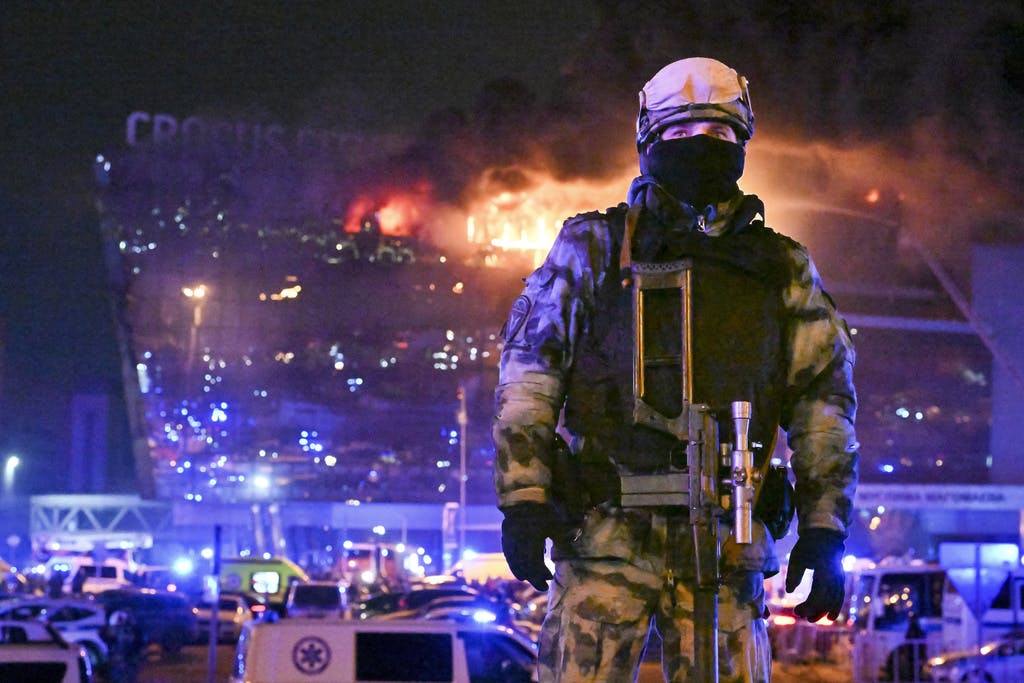As Russia Girds for ‘War’ With West Over Invasion of Ukraine, 40 Are Slain, Scores Wounded in Attack by Gunmen on Moscow Concert Hall
Mass shooting evokes memories of a 2002 theater hostage crisis in downtown Moscow, used by Putin to win backing for a scorched earth campaign against Chechnya.

Hours after the Kremlin started calling Russia’s invasion of Ukraine a “war,” five unidentified young men in combat fatigues burst into a concert at an elite Moscow concert hall. Firing automatic weapons and throwing explosives, they killed at least 40 and wounded more than 100, according to state news agency TASS, citing Russia’s Federal Security Service, or FSB.
For residents of the capital, the attack on Crocus City Hall brought back memories of a 2002 theater hostage crisis in downtown Moscow. In that siege, 40 Chechen terrorists and 132 hostages were killed. Vladimir Putin, early in his presidency, used the public outrage to win backing for a scorched earth campaign against the breakaway Muslim republic.
The chairman of the Committee on Defence and Security of the Russian Federation Council, Viktor Bondarev, told RIA Novosti that he considers what happened at the Moscow concert venue a terrorist attack and sabotage by Ukraine.

As Friday’s attack was unfolding, a news agency close to Russian security agencies, SHOT, started to charge that the terrorists had Ukrainian connections. The agency posted photos of police inspecting a white van with an obscured license plate, allegedly Ukrainian. Other Russian news agencies posted wanted photos of five men from Ingushetia, a Russian republic bordering Chechnya.
On March 3, police in Ingushetia waged a 13-hour firefight with separatists from the Ingush Liberation Army. Six militants were killed in the siege at the town of Karabulak. In a video clip posted shortly after, Abdullah Egi, a self-identified ILA combatant, said that he and his fellow mujahidin will continue their “jihad for the destruction of the Evil Empire” and the triumph of the Islamic values.
On March 8, the American embassy at Moscow warned that “extremists” had imminent plans for an attack in Moscow. This warning came hours after Russian security services said they foiled a planned shooting at a synagogue by a cell from the Afghan arm of Islamic State.
Friday evening at Moscow, before the bodies had been counted, the deputy chairman of Russia’s Security Council, Dmitry Medvedev, said: “If it’s determined it’s Kyiv regime terrorists,” then “All of them must be found and destroyed mercilessly as terrorists. Including the state officials who committed such atrocity. Death by death.”
Hours after the shootings, the White House national security spokesman ,John Kirby, said there was “no indication at this time that Ukraine, Ukrainians were involved.” In response, Russian Foreign Ministry spokeswoman Maria Zakharova said: “The White House said it sees no signs that Ukraine or Ukrainians are involved in the terrorist attack in Moscow. On what basis do officials in Washington draw any conclusions in the midst of a tragedy about someone’s innocence?”
The terrorists chose a prestigious venue, known throughout Russia for its televised entertainment extravaganzas. In November 2013, President Trump brought the Miss Universe contest to the venue, which can seat 6,000. Mr. Trump, a friend of the owner Aras Agalarov, a billionaire Russian real estate mogul close to Putin, hoped to build a Moscow Trump Tower. It was Mr. Trump’s only known trip to Moscow.
Friday night, as Crocus City burned, helicopters dumped water on the collapsing roof. Earlier in the day, Kremlin spokesman Dmitry Peskov told a Russian publication, Argumenti i Fakti, that Moscow saw itself as in a “state of war” because of the West’s intervention on Kyiv’s side.
Mr. Peskov argued that the earlier euphemism for the invasion, a “Special Military Operation,” should be dropped so Russians can prepare for “internal mobilization” for what the Kremlin portrays as an existential struggle akin to that waged by the Soviet Union against Nazi Germany in World War II.

